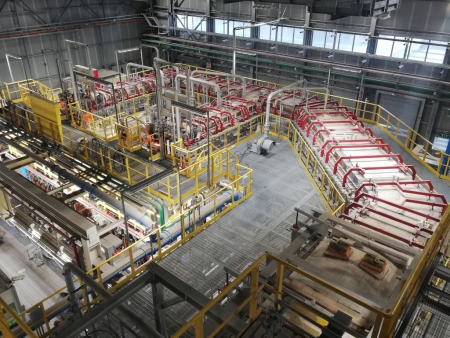Portogruaro factory expansion success

Earlier this year, Zignago Vetro expanded production capacity at its Portogruaro factory near Venice for flint, Georgia green or dark green glass. The expansion involved building a greenfield production area, including hall construction and the required infrastructure. As part of this project, the company also took the opportunity to optimise the production areas from melting to packaging.
The melting furnace supplied by Nikolaus SORG GmbH is a state-of-the-art regenerative end-fired furnace, featuring low energy consumption values and NOx emissions. SORG also supplied the complete heating system (including emergency heating), as well as the control and SCADA systems. Combustion is performed via gas or alternatively, heavy oil. The waste gas rail is intended for the subsequent connection of an emission control system. Moreover, the furnace is equipped with a melting booster and a barrier booster, as well as a refiner and throat booster, which leads to a higher melting capacity.
The glass conditioning system (illustrated) consists of a SORG STW working end and two SORG 340S tandem forehearths in an F-shape. This type of tandem forehearth provides considerable flexibility and is therefore easy to install. Each of the forehearths is equipped with a stirrer system and supplies IS tandem machines with glass.
The batch charging system was supplied by EME GmbH and features two IRD doghouses and two EME-NEND S2 screw chargers. This type of batch charger is characterised by a completely sealed doghouse, which eliminates the uncontrolled entry of false air and reduces dust formation. Furthermore, the EME-NEND S chargers enable optimal batch distribution and minimise wear to the screw, which ensures an increased lifetime.
The plant is designed so that melting capacity can be extended during the first furnace repair. Furnace construction was carried out by SKS Iberica and equipment installation by Nikolaus SORG GmbH. Since the start of production in February, glass quality has exceeded expectations and the energy consumption as well as CO2 emissions were lower than predicted.



